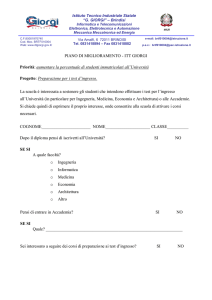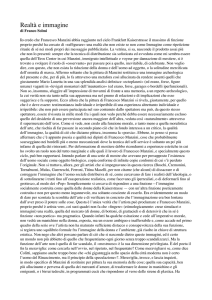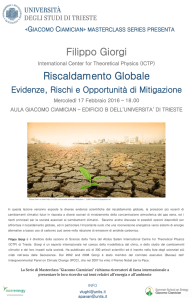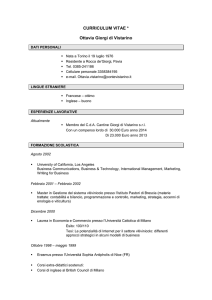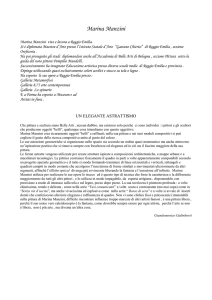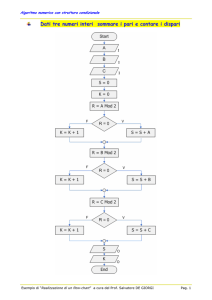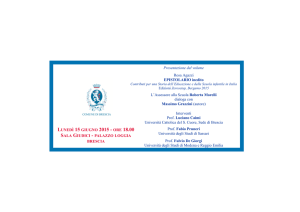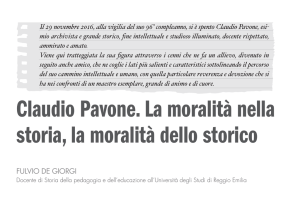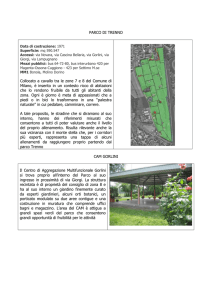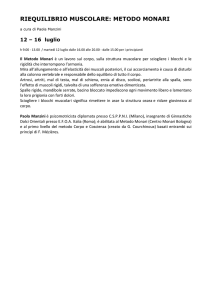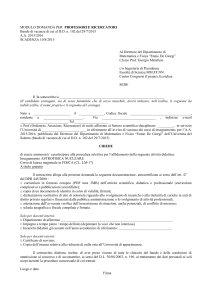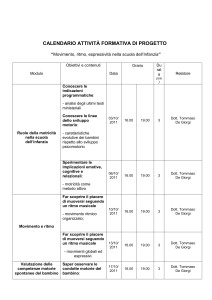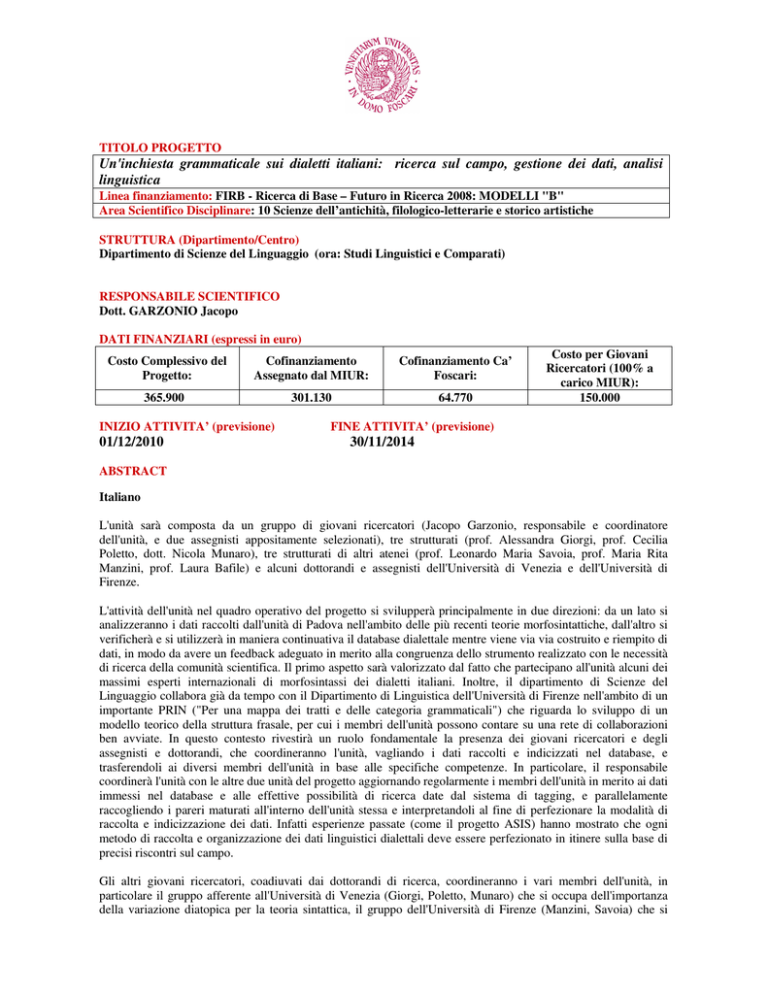
TITOLO PROGETTO
Un'inchiesta grammaticale sui dialetti italiani: ricerca sul campo, gestione dei dati, analisi
linguistica
Linea finanziamento: FIRB - Ricerca di Base – Futuro in Ricerca 2008: MODELLI "B"
Area Scientifico Disciplinare: 10 Scienze dell’antichità, filologico-letterarie e storico artistiche
STRUTTURA (Dipartimento/Centro)
Dipartimento di Scienze del Linguaggio (ora: Studi Linguistici e Comparati)
RESPONSABILE SCIENTIFICO
Dott. GARZONIO Jacopo
DATI FINANZIARI (espressi in euro)
Costo Complessivo del
Progetto:
Cofinanziamento
Assegnato dal MIUR:
Cofinanziamento Ca’
Foscari:
365.900
301.130
64.770
INIZIO ATTIVITA’ (previsione)
01/12/2010
Costo per Giovani
Ricercatori (100% a
carico MIUR):
150.000
FINE ATTIVITA’ (previsione)
30/11/2014
ABSTRACT
Italiano
L'unità sarà composta da un gruppo di giovani ricercatori (Jacopo Garzonio, responsabile e coordinatore
dell'unità, e due assegnisti appositamente selezionati), tre strutturati (prof. Alessandra Giorgi, prof. Cecilia
Poletto, dott. Nicola Munaro), tre strutturati di altri atenei (prof. Leonardo Maria Savoia, prof. Maria Rita
Manzini, prof. Laura Bafile) e alcuni dottorandi e assegnisti dell'Università di Venezia e dell'Università di
Firenze.
L'attività dell'unità nel quadro operativo del progetto si svilupperà principalmente in due direzioni: da un lato si
analizzeranno i dati raccolti dall'unità di Padova nell'ambito delle più recenti teorie morfosintattiche, dall'altro si
verificherà e si utilizzerà in maniera continuativa il database dialettale mentre viene via via costruito e riempito di
dati, in modo da avere un feedback adeguato in merito alla congruenza dello strumento realizzato con le necessità
di ricerca della comunità scientifica. Il primo aspetto sarà valorizzato dal fatto che partecipano all'unità alcuni dei
massimi esperti internazionali di morfosintassi dei dialetti italiani. Inoltre, il dipartimento di Scienze del
Linguaggio collabora già da tempo con il Dipartimento di Linguistica dell'Università di Firenze nell'ambito di un
importante PRIN ("Per una mappa dei tratti e delle categoria grammaticali") che riguarda lo sviluppo di un
modello teorico della struttura frasale, per cui i membri dell'unità possono contare su una rete di collaborazioni
ben avviate. In questo contesto rivestirà un ruolo fondamentale la presenza dei giovani ricercatori e degli
assegnisti e dottorandi, che coordineranno l'unità, vagliando i dati raccolti e indicizzati nel database, e
trasferendoli ai diversi membri dell'unità in base alle specifiche competenze. In particolare, il responsabile
coordinerà l'unità con le altre due unità del progetto aggiornando regolarmente i membri dell'unità in merito ai dati
immessi nel database e alle effettive possibilità di ricerca date dal sistema di tagging, e parallelamente
raccogliendo i pareri maturati all'interno dell'unità stessa e interpretandoli al fine di perfezionare la modalità di
raccolta e indicizzazione dei dati. Infatti esperienze passate (come il progetto ASIS) hanno mostrato che ogni
metodo di raccolta e organizzazione dei dati linguistici dialettali deve essere perfezionato in itinere sulla base di
precisi riscontri sul campo.
Gli altri giovani ricercatori, coadiuvati dai dottorandi di ricerca, coordineranno i vari membri dell'unità, in
particolare il gruppo afferente all'Università di Venezia (Giorgi, Poletto, Munaro) che si occupa dell'importanza
della variazione diatopica per la teoria sintattica, il gruppo dell'Università di Firenze (Manzini, Savoia) che si
occupa dell'interfaccia sintassi/semantica, e la prof. Bafile, che contribuirà come esperta dell'interfaccia
fonologia/sintassi. Le diverse competenze presenti nell'unità potranno così contribuire in maniera sistematica e
determinante allo sviluppo del database. Si prevede che l'attività di feedback potrà realizzarsi concretamente
grazie a incontri regolari, nella forma di giornate di studio o di seminari con l'intervento dei membri delle altre
unità o di esperti esterni al progetto. Si prevede di individuare cinque o sei campi di indagine principali, relativi a
macrofenomeni morfosintattici, ognuno dei quali verrà affidato a un gruppo di approfondimento che avrà a capo
uno dei collaboratori strutturati. In tal modo i dati ricavati dal database potranno essere esaminati da ogni singolo
gruppo in maniera continuativa. I gruppi si incontreranno poi regolarmente per presentare i risultati del lavoro
svolto e raccogliere le indicazioni da trasmettere alle altre unità. Inoltre è prevista la partecipazione di esperti
provenienti da università estere, che terranno seminari informativi su specifici aspetti morfosintattici (con aspetti
descrittivi di singole varietà o aree dialettali) e potranno partecipare agli incontri dell'unità:
Guido Mensching (Berlino), Eva Remberger (Costanza), Roberta D'Alessandro (Leida).
Inglese
The linguistic unit based in Venice will be hosted by the Department of Language Sciences. It will be formed by a
group of junior researchers (Jacopo Garzonio, coordinator of the unit, and two post-doc fellows selected for this
specific project), two professors and a researcher of the university "Ca' Foscari" of Venice (prof. Alessandra
Giorgi, prof. Cecilia Poletto, dr. Nicola Munaro), three professors of other universities (prof. Leonardo Maria
Savoia, prof. Maria Rita Manzini, prof. Laura Bafile) and some doctoral students and post-doc fellows from the
universities of Venice and Florence. The activity of the unit in the frame of the project will develop mainly along
two directions: on the one hand the unit will analyze tha data collected by the linguistic unit of Padua according to
recent theories about morpho-syntax, on the other hand it will use and check the dialectal database while it is
constructed and implemented, in order to get an adequate feedback. This process will assure that the database is
proper and satisfactory for the research needs of the scientific community. The first aspect will be improved by
the participation of some of the major international experts in the morpho-syntax of Italian dialects. Moreover, the
Department of Language Sciences already collaborates with the Department of Linguistics of the University of
Florence in an important national project ("A mapping of features and grammatical categories"), which has the
goal to develop a theoretical model of the sentence structure. Thus, members of the unit can benefit from an
existing network of collaborations. In this context the presence of junior researchers and doctoral students will be
very important, since they will have the task to coordinate the work of the unit, to check the data inserted in the
database and to transfer them to the other members of the unit according to their personal specializations. In
particular, the responsible of the unit will coordinate it with the other two units of the project, regularly updating
the collaborators about the implemented data and the effective possibilities given by the tagging system. In a
parallel way, he will collect the opinions of the collaborators and use them in order to improve the data collecting
techniques and the organization of the tagging system. Past experience (like the ASIS project) has shown that any
method of collecting and organizing dialectal data has to be improved 'in itinere' on the base of first results of the
field work.
The other junior researchers, helped by the doctoral students, will coordinate the groups of the unit: more
precisely, the Venice group (Giorgi, Poletto, Munaro), which will deal with the relevance of dialectal variation for
the syntactic theory, the Florence group (Manzini, Savoia), which will deal with the syntax/semantics interface,
and prof. Bafile, who will give her contribution as expert of the syntax/phonology interface. Since the unit
displays different and complementary competences, its contribution to the development of the database will be
determinant and systematic. The feedback activity will carried out in form of workshops and/or seminars with the
participation of members of other units or external experts. More precisely, the unit will single out five or six
main research fields, concerning with morphosyntactic macrophenomena. Each of them will be entrusted to an
analysis group, headed by one of the major collaborators. Thus, every group will be able to work continuously on
its argument and the data regarding it. The groups will meet regularly in order to present the results and to collect
the indications for the other units. We plan to collaborate with external experts that will give seminars on specific
topics in morpho-syntax (with descriptive presentations about single varieties or dialectal areas) and will
participate in the regular meetings of the unit: Guido Mensching (Berlin), Eva Remberger (Konstanz), Roberta
D'Alessandro (Leiden).

